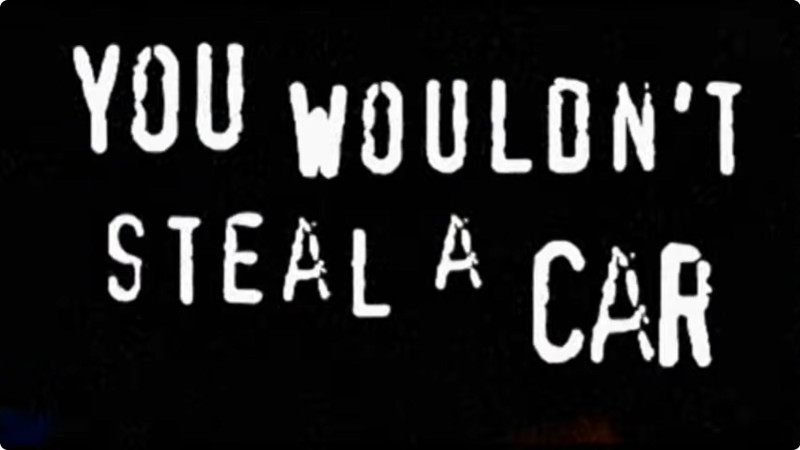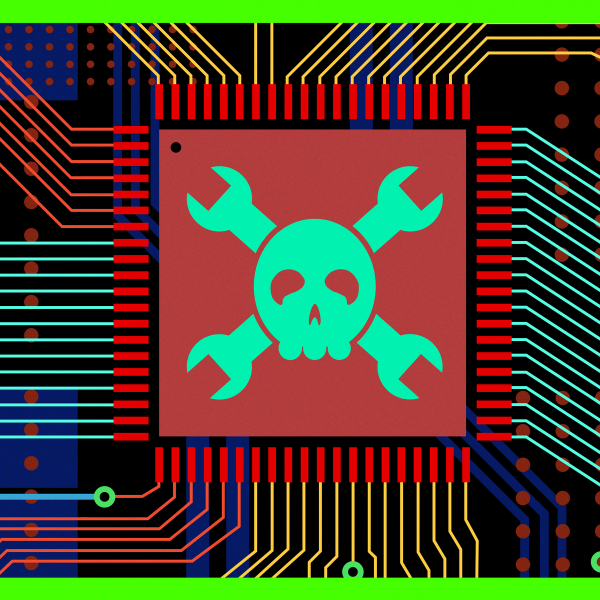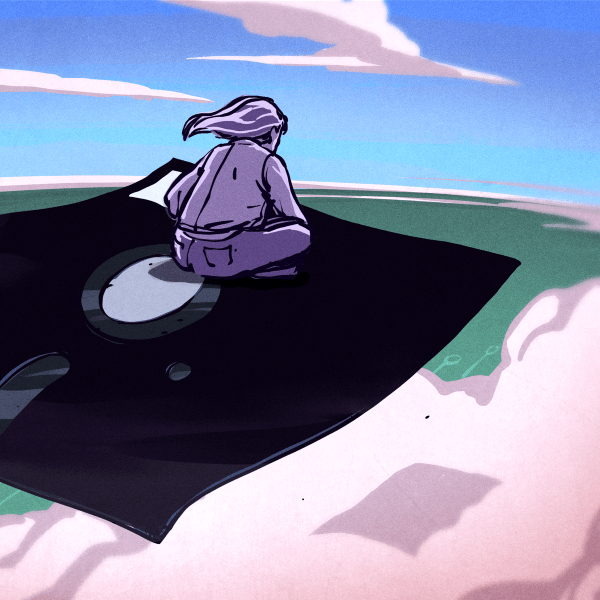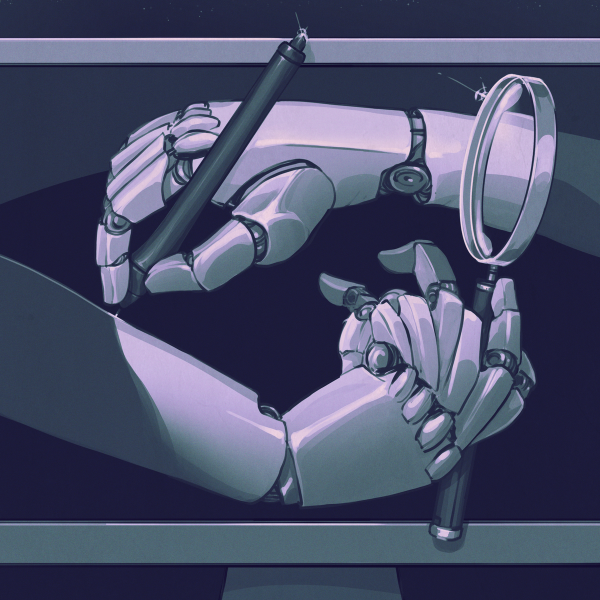In the 2000s, the DVD industry was concerned about piracy, in particular the threat to their business model presented by counterfeit DVDs and downloadable movies. Their response was a campaign which could be found embedded into the intro sequences of many DVDs of the era, in which an edgy font on a black background began with “You wouldn’t steal a car.. “. It was enough of a part of the background noise of popular culture that it has become a meme in the 2020s, reaching many people with no idea of its origins. Now in a delicious twist of fate, it has been found that the font used in the campaign was itself pirated. Someone should report them.
The font in question is FF Confidential, designed by [Just van Rossum], whose brother [Guido] you may incidentally know as the originator of the Python programming language. The font in the campaign isn’t FF Confidential though, as it turns out it’s XBAND Rough, a pirated copy of the original. What a shame nobody noticed this two decades ago.
It’s a bit of fun to delight in an anti-piracy campaign being caught using a dodgy font, but if this story serves to tell us anything it’s that the web of modern intellectual property is so labyrinthine as to be almost impossible to navigate without coming a cropper somewhere. Sadly the people caught out in this case would be the last to call for reform of the intellectual property environment, but as any sane heads would surely agree, such reform is overdue.
If copyright gives you a headache, here’s our take on it.
















“a pirated copy of the original”
When it comes to fonts, you need to define that in detail.
which basically takes the incentive out of building anything or creating anything. if it weren’t for the profit motive involved with patents, we wouldn’t have even got to the steam age.
why put years of your life into inventing something, if 30 seconds after you show it someone comes along and steals it?
Innovation and products would still happen, for sure.
This thing is happening inside China and it is just their normal standard. Strong ones will survive and those who loose, start over.
They don’t care about IP because US, Japanese, and Korean companies do the innovation for them. That works for them!
Doesn’t work so well for most of the companies who do the development, and doesn’t work so well for indies who create something cool and stick it on tindie only to have it appear on AliExpress for a fraction of the cost. And it’s not just tech; fashion, dice, keycaps, … you name it.
Doesn’t work so well for manufacturers who can’t trust the quality of the parts they buy because of supply chains being flooded with fakes.
And whilst they like the cheap, it also doesn’t work so well for consumers who often struggle to find genuine product to buy, meaning they can’t support the original devs when they want to, and they often end up buying badly made unsafe goods.
Incorrect,
China has both patents and copyrights.
The China National Intellectual Property Administration issued over 1 million invention patents, over 2 million utility patents, and almost 700k design patents in 2024 alone.
They just have very lax enforcement of FOREIGN patent and copyright laws.
The US is lax about enforcing FOREIGN patent and copyright laws as well. Look what happened to UGG boots for example.
China grants more patents per year than the USA, they still protect IP if it’s theirs.
I was gonna say that James Watt’s patents in fact stifled innovation, but https://www.jstor.org/stable/10.1086/658495 (I only read the abstract) claims that is a hoax…
yep, this is why open-source has been such a flop, with only 96% of codebases containing open-source code. there’s absolutely zero incentive to develop it.
https://www.intel.com/content/www/us/en/developer/articles/guide/the-careful-consumption-of-open-source-software.html
Open source is still protected intellectual property.
That’s why any major repo has a license, like GNU, MIT, Apache, etc.
They have licenses because the copyright system is BS. If they were public domain then a corporation could make one change to it, copyright it, and sue the original creator. Only a moron would still support copyright in 2025.
Tell me you understand jackshit about software licenses without telling me. Not to mention the fact that many OSS project maintainers are quitting precisely because there is no clear, ethical way to make money in open source (and no, Canonical and RedHat don’t count as ethical)
I guess you missed the whole “you can pay for support” and “you can pay to have features added” options that some developers are going with.
This isn’t a thing that happens. Individual inventors can’t afford patents nor can they afford to defend those patents if someone were to infringe upon them.
They’re 10s of thousands of dollars
Most patents run $8-15K in patent attorney fees.
The actual patent fees for small entities are reduced and if you qualify as a microentity (named on fewer than 4 existing patents and have a gross income below $241K) the fees are trivial.
I paid no attorney fees getting my first two patents, Self wrote. I paid around $2-3K in total fees for each, that includes search, initial filing, examination, and issuance.
Once they were issued I ended up hiring an attorney to handle the licensing negotiation/agreements. I spent a little over $10K in total licensing two patents to two separate companies.
That firm handled my next two patents, start to finish through licensing. My third patent set me back $35K. I had been named previously on a patent issued through an employer so my fourth personally granted patent I didnt qualify for reduced microentity rate but still qualified as a small entity. The government fees are double the microentity rate but my total cost ended up only slightly higher than my third coming in at $37K.
Now I cant argue that enforcing patents is far too costly for most individuals.One company that is the assignee of one of my patents has spent over a million in legal fees dealing with a competitor who is infringing on 3 of the claims of the patent they own. Ive never messed with any of that beyond giving testimony in court.
I identify problems in industry, find solutions through rigorous experimentation, patent my results, and target manufacturers already engaged in that sector with the opportunity to license my technology and hire me on a consultancy basis to integrate, implement, and maintain them into their production lines. Without patent protection Id just be a guy trying to get hired with a few notebooks of good ideas, hoping not to get screwed out of them.
I like your business model.
Well done making a profit from the lone inventor business… I can’t be the only one here hoping to do that myself some day. Would you be able to suggest what sort of field you’ve been inventing in, what sort of concepts and products can a lone inventor still work in, some types of things one might develop are obviously out-of-scope given they need many different people’s expertise to make a working system, other things are the types of ideas which can simply never be very commercially useful, to many things one can invent solve a problem one’s-self has but aren’t applicable to the needs of anyone else who might wish to buy them, too many things for which there isn’t a market… Especially as your inventions are protected by patents, could you point out roughly what sort of things they are? What fields of system/product/subsystem can a lone inventor still do well in?
@ Robert
I dont focus on products. I focus on means of production.
I was the kind of kid that read the dictionary, the encyclopedia, even the phonebook. When I discovered the USPTO database online in the late 90s I became hooked on reading and understanding patents.
I spend a lot of time investigating companies and their existing patents. In understanding how things are being done, I often come up with my own ideas of ways things can be done better. If I can prove my theories, and show actually improvements in processes, then I have something that can be marketed to the patent holder who inspired me or to their competitor. should they turn me down.
Its not easy work. I have half a dozen projects going at any time. I sometimes spend 3-5 years chasing an idea only to abandon it when it fails, or a comparable patent drops. Ive only managed 7 solo patents in the ~25 years Ive been doing this.
In all honesty, I make more money as a manufacturing efficiency consultant than all of my IP combined, but I wouldnt book those jobs without my patents, references, and client recommendations.
Most of my actual work is taking small manufacturing lines from manual production techniques to basic automation. There are many companies doing tasks manually that can be done with machines that are decades old. There are lots of bits and bobs between machines that have to be designed and fabricated to make things run smoothly, thats my bread and butter.
I have pet projects sitting on the workshop shelf that could probably fly off store shelves, but Im not that guy. Im a tinkerer and a thinker. Im more motivated by discovery than the dream of wealth.
But dont let my path and way restrict you. Watch some of those cheesy entrepreneur investment shows. There are people making all sorts of things, sometimes only marginal improvements on whats in the market already, starting multimillion dollar companies. If youve got a head for business and the ability to self fund, or talk people into believing in your ideas, theres a ton of opportunity out there waiting to be tapped.
” if it weren’t for the profit motive involved with patents”
Wrong. As soon as James Watt got his patent, innovation stood still for 20 years. Source: Against Intellectual Monopoly, Boldrin & Levine.
That’s great on theoretical paper, but people with deeper pockets and/or slave wage labor available don’t exactly constitute a level playing field.
Physical products have actual costs.
Deeper pockets, all else being equal, in your own territory can manufacture at less cost using existing facilities that you might have to build. Or you might sub out the work at a price higher than you could achieve with your own facility. So, they have a meaningful advantage. Or, they could manufacture, sell at cost or a loss until you have to close up shop because you now can’t sell your product that you spent years of time and barrels of money to develop.
Relative slave wage labor from a different market can similarly render your price entirely non-competitive. If one chooses to support forced labor under despotic leaders, one could maybe sub out their manufacturing to that low wage service provider. That puts the product owner in the position of possibly/probably being party to what their ethics would consider to be human rights violations.
no it doesn’t. Many MANY things are created even without patents. (Seat belts, computer mice, the internet, penicillin, xrays, ballpoint pens, the coke recipe, etc) Its arguable that patents and IP restrict innovation in far more cases than they protect it for the few with the resources to actually wield the tools and utilize their power.
CocaColas recipe was not patented. It is not protected, you can clone cocacola as closely as you can and market your own cola. They choose to rely upon its status as a trade secret which does not require them to disclose it in a patent which would have long expired leaving their recipe in public domain.
The internet, as a general concept and infrastructure, was not patented. While individual components and technologies like TCP/IP have been patented, the core concept and architecture of the internet is not subject to patent ownership.
But beyond that, youre wrong.
The earliest documented seat belt patent was awarded in 1885 to Edward J. Claghorn. While Volvo patented the three-point seat belt in 1959
The computer mouse was patented in 1970. The patent application was filed in 1967 and granted in 1970 under the title “X-Y position indicator for a display system”. The invention was by Douglas Engelbart
Alexander Fleming discovered penicillin in 1928, but did not patent it. In 1940, Howard Florey and Ernst Chain isolated and purified penicillin, and obtained a patent for its production process in the United Kingdom. In 1945, Andrew Moyer obtained a patent for a method of mass-producing penicillin in the United States.
X-rays were patented soon after their discovery. While Wilhelm Conrad Roentgen discovered X-rays in 1895, the first patent application was filed by Siemens & Halske in 1896
The first patent for a ballpoint pen was granted to John J. Loud on October 30, 1888.
So both penicillin and xrays were patented after the discovery and by someone else?
Never hear of open source?
Never heard of software licenses? Are you dumb? LoL
Yes, nobody invented anything and we all ran around naked and covered in mud until the light of the Free Market(TM) illuminated our darkened world ca 1300AD
You must be from the leaded gasoline generation.
If your only incentive is profit, you must live a bleak and sad life.
Life is about learning, sharing, and innovating.
When we abolish capitalism, these won’t be issues anymore. People won’t be worried about copying when money is worthless
Weird, humans seem to have had no problem with innovating for millenia with no profit motive. Its as if all the motive thats really needed is to make life easier and better.
Damn, i could have sworn the ad said “You wouldn´t download a car” ….. anyone else?
I remember “you wouldn’t download a pizza”, or some variation thereof.
I’m certain it was “You wouldn’t steal a baby”
No, it is “You wouldn’t steal a handbag”
https://www.youtube.com/watch?v=ALZZx1xmAzg
yes, there is a version of it out there, think it was later when high speed internet became more available … before that you would rent or share a dvd and copy it
The “download” but was part of a spoof version of the add for the show “Mitchell and Webb Look” where they exaggerated the original for comic effect. Most people think of this version more than the original
the problem isn’t the people that made it, those are the innovators the system was intended to help. its the 2nd..Nth party rights holders who plan to profit forever on work they didn’t do. i dont think either should be a commodity that can be traded, nor do i think either should outlive the original filer. im still ok with that filer being a company, in which case if the company folds, the copyright/patent expires.
Patents are regarded as assets. In the case of bankruptcy, sale of patents helps pay off the debts the company has accumulated. Why screw an innocent supplier to a company that has failed?
That’s not how it works. That’s not how any of this works.
So font ‘s property is annoying, same for copyrighted catchy phases, I mean anyone can spend some weeks being creative and making a cool font and when is finally ready ,you discover that someones has the rights of a very similar font. Saying it happens only in China is silly or politically biased.
China has made it a national policy to extort technological information from organizations that want to do business in China. China also sends students to other countries to steal information. So far as I know, the former is unique to China.
China isnt stealing technology by creating legal contracts with buisnesses that want to use Chinas cheap labor. Its a trade off. You get to profit more, China gets new technology.
If you dont want China to have it, dont have them manufacture it for you.
And wvery nationa sends students to other nations to learn. Always have.
Many third world dictators were educated in elite US universities.
This article ignores the fact that typefaces aren’t copyrightable in the United States, only specific implementations (e.g., a font file).
Well that seems like a simple loophole. Write a script that scrapes copyrighted font files, converts them to OTF format, and republishes them as public domain. If I knew that file conversion was sufficient I’d have been using “free for personal” fonts in commercial projects years ago.
The source arrival refers to it as a clone.
It’s entirely relevant to the conversation, but has been ignored for the hype.
Article
Is it irony or just sad? Not too long ago, I’ve learned the music used was inspired, as they didn’t want to pay for the original. Only to underpay the artist as they lied about how the music was going to be used. At this moment, I wouldn’t be surprised if the idea, clips, or other parts are stolen as well.
This article explains what happened. It’s bad…
https://torrentfreak.com/rights-group-fined-for-not-paying-artist-for-anti-piracy-ad-120717/
Every font is free
https://youtu.be/J06tluN7rtE
I never bought a (standalone) DVD player, simply because of the non skippable menu’s and ridiculous piracy accusations. I waited though them once or twice at a friends house, (while searching the fridge for fresh beer). As a result, pirated copies were my only option, and I only got a sniff of the “you would not steal” campain though secondary sources, as all that nonsense was already removed from torrents, or ignored by PC movie player software. “De-CSS” was a bit of a thing for some time back then :)
I had several DVD players over the years and only one(a Sony ) I was not able to somehow skip the pre-play
Iirc the music in the commercial was also ripped off.
Came to the comments to say this!
That was the main thing I remember from this. Crazy that the font was misused too!
Hmmm, yet another Lunduke scoop posted here without credit. I guess Lunduke is the name that cannot be spoken around here just like every other tech site.
That’s a very strange thing to say. We linked to exactly where we heard about it from. No conspiracy, no nothing.
And it looks like Melissa Lewis, who is the source that [Rib] cites, just says “today I learned” and linked to Wikipedia. She didn’t mention where she learned it. So dead-end for us.
Do you have a link for the source that you think is primary on this?
It’s not that strange when you realise the main thing the named person seems to have achieved is a terrible rep for self promotion and some really rather dodgy opinions on inclusivity.
What the heck is a Lunduke? 🤔
It’s a Logical Unit of disk storage, and don’t call me duke 🤣
What?
To “come a cropper” is standard English. In the narrow sense, it means to be thrown off a horse. In the wider sense, it means to fail disastrously.
Confidential is a typeface not a font.
Tyre.*
Ff confidential isn’t a font. It is a typeface.
Are you the CEO of one of the big movie companies who make billions as they rip off the work of creative people who are forced to live below the poverty line?
You must live AI slop
“web of modern intellectual property is so labyrinthine as to be almost impossible to navigate without coming a cropper somewhere.”
Writing software is made impossible with software patents, a mine field.
In Europe, the third attempt to impose software patents is succeeding without any protest, the national judges were replaced by pro-software patent judges like Nokia, without any possibility for the CJEU to intervene:
https://ffii.org/nokia-and-airbus-elected-as-judges-at-the-kangaroo-unified-patent-court-kupc/
What a wonderful we live in.
And no news coverage is even better.
Hahahahaha. “Copyright and patents should be abolished” The shit you read on the internet.
I get the both sides of the argument for or against patents. I feel like it depends on the field. Drugs would be a lot slower to develop without patents. Pharma companies are feast or famine. A new drug costs hundred of millions to billions to develop. If they spent that and then others just make what they found works they’d not even try. If a drug gets close to being approved then isn’t, the company will likely fold, even Pfizer is like that. A drug fails and they close a site. I’m sure academia will still try but it would be a lot slower. Also keep in mind drug patents do expire so it’s not a bad balance. Also pharma companies do have their problems, some are shady etc but that’s any industry and they really milk the “feast” phases of their cycles.
fwiw i would hundo p steal a font. when my ibook aged out, i copied around its helvetica font file for the better part of a decade because i liked it better than whatever default my browser was using back then. i eventually gave up on it and now the chrome default looks ‘normal’ to me, but if i had time to kill fighting the browser i would like to load up that font again